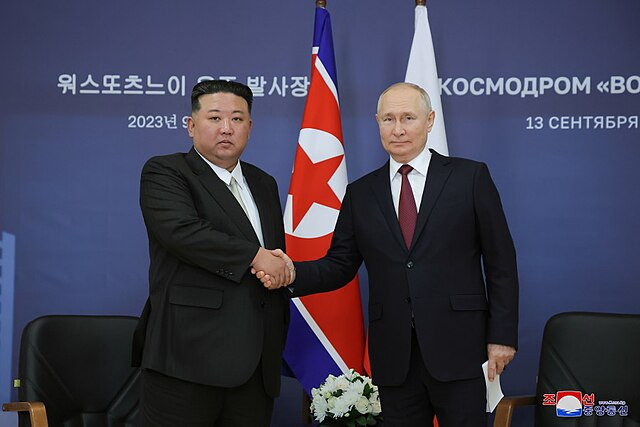Russian President Vladimir Putin, heading to North Korea for the first time in 24 years, has vowed to deepen cooperation with Pyongyang to counter U.S.-led sanctions and support each other's confrontations with Washington. This visit marks a significant step in the strengthening alliance between the two nations amidst rising geopolitical tensions.
In an op-ed piece published in North Korean state media hours before his arrival, Putin thanked North Korea for its steadfast support of Russia's actions in Ukraine. He emphasized the mutual resolve to oppose Western attempts to hinder a multipolar world order, stating that both nations would "resolutely oppose" such ambitions.
Putin's visit comes as both countries face intense international scrutiny and economic sanctions-North Korea over its nuclear weapons and missile programs, and Russia over its invasion of Ukraine. The Russian leader underscored the need to develop independent trade and payment systems to sidestep Western control and sanctions, calling the restrictions "illegal and unilateral."
As Putin's plane touched down in Pyongyang, the city was adorned with Russian flags and portraits of the Russian leader, with banners proclaiming a warm welcome to the President of the Russian Federation. This visit highlights the burgeoning camaraderie between Moscow and Pyongyang, as they navigate their respective crises.
"Russia has always supported and will continue to support the DPRK and the heroic Korean people in their opposition to the insidious, dangerous, and aggressive enemy," Putin wrote, referring to the United States. He praised North Korea's resistance against U.S. economic pressure and threats, asserting a shared stance against Western interference.
The Kremlin's focus is not limited to political and military cooperation. Putin also outlined plans to expand collaborations in tourism, culture, and education. Before heading to North Korea, he visited Yakutsk in eastern Russia to discuss technology and defense projects, and to engage with young professionals, signaling Russia's broader strategic interests in the region.
Concerns are growing about a potential arms arrangement between the two nations, wherein North Korea could provide Russia with much-needed munitions for its war in Ukraine. In return, Pyongyang might receive economic assistance and technology transfers that could bolster its nuclear weapons and missile programs. While both nations deny any weapons transfers, such exchanges would violate multiple U.N. Security Council sanctions previously supported by Russia.
The deepening relationship has alarmed U.S. and South Korean officials. John Kirby, spokesperson for the U.S. National Security Council, expressed concern about the potential implications for both the Ukrainian conflict and security on the Korean Peninsula. "The deepening relationship between Moscow and Pyongyang is concerning, not just because of the impacts it's going to have on the Ukrainian people... but because there could be some reciprocity here that could affect security on the Korean Peninsula," he said.
South Korean officials have also urged Moscow to ensure that its cooperation with North Korea does not violate U.N. Security Council resolutions or undermine regional peace and stability. Tensions on the Korean Peninsula are at their highest in years, with increased weapons tests by North Korea and joint military exercises by the U.S., South Korea, and Japan.
In March, a Russian veto ended U.N. monitoring of sanctions against North Korea, raising Western suspicions that Moscow is seeking to avoid scrutiny while buying weapons from Pyongyang. Putin's visit also includes a planned trip to Vietnam, where he will engage in trade talks, a move criticized by the U.S. for potentially offering Putin a platform to normalize his actions in Ukraine.
Victor Cha, a former U.S. national security official, highlighted the strategic implications of the Russia-North Korea alliance. "This relationship, deep in history and reinvigorated by the war in Ukraine, undermines the security of Europe, Asia, and the U.S. homeland," he wrote. Cha urged Washington to increase economic and diplomatic pressure on Pyongyang and to engage with China to address the evolving threats.




